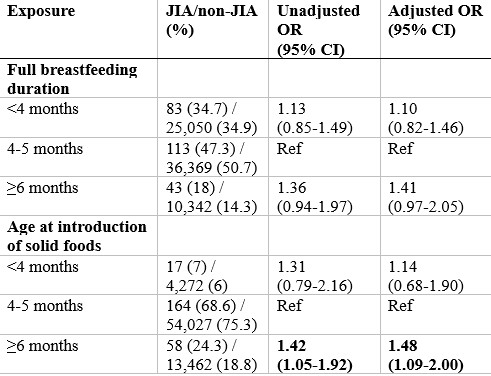Session Information
Date: Wednesday, October 29, 2025
Title: Abstracts: Pediatric Rheumatology – Clinical III (2675–2680)
Session Type: Abstract Session
Session Time: 12:30PM-12:45PM
Background/Purpose: Early-life nutrition may influence the risk of immune-mediated diseases like juvenile idiopathic arthritis (JIA). The benefits of breastfeeding are well established, but findings related to JIA have been inconsistent and mainly based on small case-control studies (1). Early introduction of solid food may promote immune tolerance (2), which could reduce the risk of immune-mediated diseases like JIA, but this has not been studied. We aimed to investigate the association between breastfeeding duration, age at introduction of solid food, and risk of JIA in a large population-based pregnancy cohort, including possible gene-environment interactions.
Methods: We used The Norwegian Mother, Father, and Child Cohort Study (MoBa), a cohort that recruited pregnant women from 1999-2008, with data from >114 000 mother-infant pairs. A JIA case was, as previously validated (3), defined as having at least two ICD-10 codes (M08/M09) by linking the cohort to the Norwegian Patient Registry. At 6 months post-partum, mothers completed a questionnaire reporting infant feeding practices. Full breastfeeding was defined as receiving only breast milk without any formula or solid food. We categorized breastfeeding and age at solid food introduction as: < 4 months, 4–5 months (reference), and ≥6 months.We used multivariable logistic regression and estimated odds ratios (aORs) adjusted for: maternal history of inflammatory rheumatic disease, age, education, BMI, parity, mode of delivery, preterm birth and gestational smoking. Umbilical cord blood sampling at birth allowed genotyping of a subsample of the children. We calculated polygenic risk scores (PRSs) using summary statistics from a large genome-wide association study (GWAS) to estimate the children’s genetic risk of JIA (4). By using these PRSs, we assessed gene-environment interactions.
Results: Our final analytical sample included 239 infants who later developed JIA and 71,761 infants who did not, with genotyping data on 169 cases and 39,488 non-cases. The risk of JIA was non-significantly higher in those with a full breastfeeding duration ≥6 months (aOR 1.39, 95% CI 0.98-1.99) (Table 1). We identified interactions between genetic susceptibility to JIA and both short (< 4 months) and prolonged (≥6 months) breastfeeding (p = 0.02 and 0.04). Additionally, delayed introduction of solid food (≥6 months) was associated with an increased risk of JIA (aOR 1.48, 95% CI 1.09-2.00) (Table 1), with no evidence of gene-environment interaction.
Conclusion: Our findings suggest that later introduction of solid food is associated with an increased risk of JIA, supporting the hypothesis that earlier dietary exposures may promote immune tolerance. Additionally, we observed interactions between genetic susceptibility to JIA and breastfeeding duration, indicating that genetic predisposition may modify the association between breastfeeding and disease risk, which warrants further investigation.References:1) Clarke SLN, et al. Rheumatology (Oxford). 2022;61(2)2) Skjerven HO, et al. Lancet. 2022 Jun 25;399(10344)3) Hestetun SV, et al. Arthritis Rheumatol. 2025 Apr;77(4)4) López-Isac E, et al. Ann Rheum Dis. 2021;80(3)
 Table 1. Results of Analyses of Breastfeeding duration and Age at Introduction of Solid Food, and Child Risk of Developing JIA in the MoBa Cohort
Table 1. Results of Analyses of Breastfeeding duration and Age at Introduction of Solid Food, and Child Risk of Developing JIA in the MoBa Cohort
To cite this abstract in AMA style:
Dåstøl V, Caspersen I, Haftorn K, Hestetun S, Håberg S, Costenbader K, Strøm M, Olsen S, Brantsæter A, Størdal K, Sanner H. Early-Life Nutrition and Gene-Environment Interactions Influencing Juvenile Idiopathic Arthritis Risk: Results from a Pregnancy Cohort [abstract]. Arthritis Rheumatol. 2025; 77 (suppl 9). https://acrabstracts.org/abstract/early-life-nutrition-and-gene-environment-interactions-influencing-juvenile-idiopathic-arthritis-risk-results-from-a-pregnancy-cohort/. Accessed .« Back to ACR Convergence 2025
ACR Meeting Abstracts - https://acrabstracts.org/abstract/early-life-nutrition-and-gene-environment-interactions-influencing-juvenile-idiopathic-arthritis-risk-results-from-a-pregnancy-cohort/
